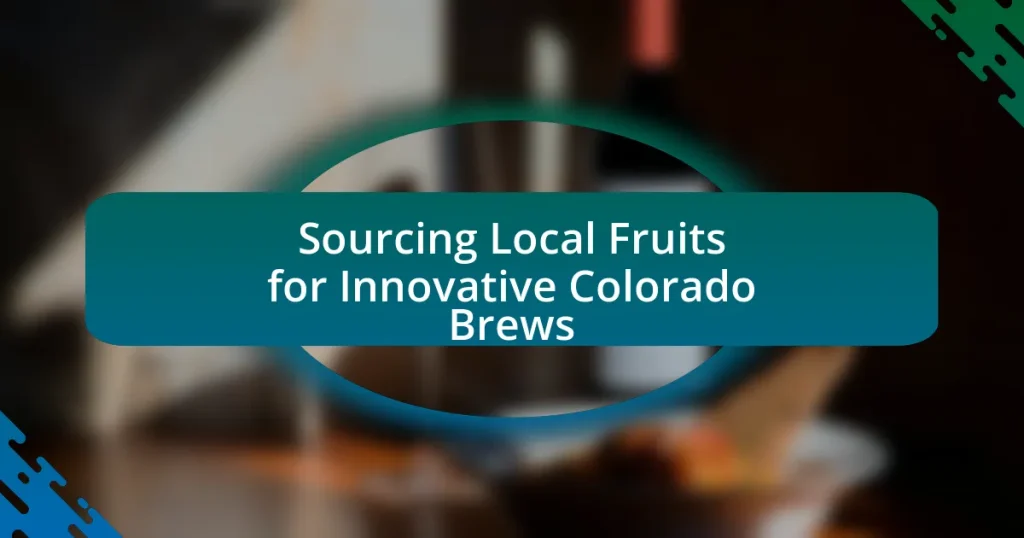Sourcing local fruits for innovative Colorado brews is a practice that enhances the flavor profiles of craft beverages while supporting local agriculture and sustainability. Breweries in Colorado utilize fruits such as peaches, cherries, and raspberries, which are harvested at peak ripeness to ensure optimal taste and quality. This article explores how local sourcing improves the brewing process, the types of fruits commonly used, the environmental and economic benefits, and the challenges faced in sourcing. Additionally, it discusses innovative practices and strategies breweries can adopt to manage seasonal variations and build strong relationships with local farmers.

What is Sourcing Local Fruits for Innovative Colorado Brews?
Sourcing local fruits for innovative Colorado brews involves the practice of obtaining fresh, regional fruits to create unique and flavorful craft beverages. This approach not only enhances the taste profiles of the brews but also supports local agriculture and promotes sustainability. For instance, breweries in Colorado often utilize fruits like peaches, cherries, and berries sourced from nearby farms, which can lead to distinctive seasonal offerings that reflect the local terroir. This method has been shown to increase consumer interest and engagement, as evidenced by the growing trend of farm-to-table practices in the beverage industry.
How does sourcing local fruits enhance the brewing process?
Sourcing local fruits enhances the brewing process by providing fresher ingredients that contribute unique flavors and aromas to the final product. Local fruits are often harvested at peak ripeness, ensuring optimal taste and nutritional value, which can significantly elevate the quality of the brew. For instance, a study published in the Journal of Agricultural and Food Chemistry found that the use of fresh, locally sourced fruits can increase the complexity of flavor profiles in craft beers, leading to a more enjoyable drinking experience. Additionally, utilizing local fruits supports regional agriculture and reduces transportation emissions, aligning with sustainable brewing practices.
What types of local fruits are commonly used in Colorado brews?
Colorado brews commonly utilize local fruits such as peaches, cherries, and raspberries. These fruits are favored for their flavor profiles and availability, particularly during the summer months when they are in season. For instance, Colorado is known for its Palisade peaches, which are often used in wheat beers and fruit-infused ales, while Montrose cherries are popular in sour beers and ciders. Raspberries from the state are frequently incorporated into various styles, enhancing the aroma and taste of the brews.
How do local fruits influence the flavor profiles of brews?
Local fruits significantly enhance the flavor profiles of brews by introducing unique taste characteristics and aromas that reflect the region’s terroir. For instance, fruits like Colorado peaches or cherries can impart sweetness, tartness, and complexity, which can elevate the overall sensory experience of the brew. The use of these fruits not only diversifies the flavor spectrum but also connects consumers to local agriculture, fostering a sense of place. Studies have shown that incorporating local ingredients can lead to distinctive flavor outcomes, as seen in craft breweries that utilize seasonal fruits to create limited-edition brews that resonate with local flavors and traditions.
Why is local sourcing important for Colorado breweries?
Local sourcing is important for Colorado breweries because it enhances the quality and uniqueness of their products while supporting the local economy. By using locally sourced ingredients, breweries can create distinctive flavors that reflect the regional terroir, which is crucial for innovation in brewing. Additionally, local sourcing reduces transportation costs and environmental impact, as ingredients do not need to be shipped long distances. This practice also fosters relationships with local farmers and suppliers, ensuring a fresher supply of ingredients and contributing to the sustainability of the local agricultural community.
What are the environmental benefits of sourcing locally?
Sourcing locally provides significant environmental benefits, primarily by reducing carbon emissions associated with transportation. When products are sourced from nearby farms or producers, the distance traveled is minimized, leading to lower fuel consumption and greenhouse gas emissions. For instance, a study by the USDA found that food transported over long distances can generate up to 11 times more carbon dioxide than locally sourced food. Additionally, local sourcing supports sustainable agricultural practices, as smaller farms often employ methods that are less harmful to the environment, such as crop rotation and organic farming. This not only preserves local ecosystems but also enhances biodiversity, contributing to healthier soil and water systems.
How does local sourcing support the Colorado economy?
Local sourcing supports the Colorado economy by enhancing job creation and promoting local businesses. When breweries and food producers source ingredients from local farms, they stimulate the regional agricultural sector, which contributes to a more robust local economy. According to a report by the Colorado Department of Agriculture, local food systems can generate up to three times more economic activity compared to non-local sourcing. This is because money spent on local products tends to circulate within the community, supporting local jobs and services. Additionally, local sourcing fosters a sense of community and encourages sustainable practices, which are increasingly valued by consumers in Colorado.

What challenges are faced in sourcing local fruits for brewing?
Sourcing local fruits for brewing presents several challenges, including seasonal availability, quality consistency, and supply chain logistics. Seasonal availability can limit the types of fruits brewers can use at any given time, as many fruits have specific harvest periods. Quality consistency is another issue, as local fruits may vary in flavor and ripeness, impacting the final product. Additionally, supply chain logistics can complicate sourcing, as brewers must coordinate with local farmers and manage transportation to ensure freshness, which can be difficult in remote areas. These challenges can hinder the ability to create innovative brews that rely on specific local fruit profiles.
How do seasonal variations affect fruit availability?
Seasonal variations significantly affect fruit availability by determining the growth cycles and harvest times of different fruit species. For instance, fruits like strawberries and cherries are typically available in late spring to early summer, while apples and pumpkins are harvested in the fall. This seasonal pattern is influenced by climate factors such as temperature and rainfall, which dictate when fruits bloom and ripen. According to the USDA, the availability of specific fruits can vary by region, with local climates impacting the timing and quantity of harvests, thus affecting market supply and pricing throughout the year.
What strategies can breweries use to manage seasonal sourcing?
Breweries can manage seasonal sourcing by establishing relationships with local farmers to secure consistent access to seasonal fruits. This strategy allows breweries to plan their production schedules around the harvest cycles of specific fruits, ensuring they have the necessary ingredients when needed. Additionally, breweries can implement inventory management systems that track seasonal availability and forecast demand, which helps in making informed purchasing decisions. Collaborating with other breweries for bulk purchasing can also mitigate risks associated with seasonal fluctuations. According to a study by the Brewers Association, breweries that engage in local sourcing not only enhance their product offerings but also strengthen community ties, which can lead to increased customer loyalty and sales.
How do weather conditions impact fruit quality and supply?
Weather conditions significantly impact fruit quality and supply by influencing growth rates, disease susceptibility, and harvest timing. For instance, excessive rainfall can lead to waterlogged soils, which negatively affect root health and fruit development, resulting in lower quality yields. Conversely, optimal temperatures and adequate sunlight promote healthy growth and enhance flavor profiles, leading to higher quality fruits. According to the USDA, variations in temperature and precipitation patterns can cause fluctuations in fruit supply, with drought conditions leading to reduced yields and increased prices. This relationship underscores the importance of monitoring weather patterns for effective fruit sourcing in innovative brewing processes.
What logistical issues arise in sourcing local fruits?
Logistical issues in sourcing local fruits include transportation challenges, seasonal availability, and storage limitations. Transportation can be complicated due to the need for timely delivery to maintain freshness, which may require specialized vehicles. Seasonal availability affects the consistency of supply, as certain fruits may only be harvested during specific times of the year, leading to potential shortages. Additionally, storage limitations can arise from the perishable nature of fruits, necessitating proper facilities to prevent spoilage. These factors collectively impact the efficiency and reliability of sourcing local fruits for production.
How can breweries establish reliable relationships with local farmers?
Breweries can establish reliable relationships with local farmers by engaging in consistent communication and collaboration. This involves regular meetings to discuss needs, expectations, and seasonal availability of ingredients, fostering trust and transparency. Additionally, breweries can support farmers by purchasing ingredients directly, ensuring fair pricing and timely payments, which strengthens the economic ties. Research indicates that local sourcing not only enhances product quality but also builds community resilience, as seen in the Colorado craft beer industry, where breweries often highlight their partnerships with local farms in marketing efforts. This mutual benefit creates a sustainable ecosystem that supports both breweries and farmers.
What role does transportation play in the sourcing process?
Transportation is crucial in the sourcing process as it facilitates the movement of local fruits from growers to breweries. Efficient transportation ensures that fruits are delivered fresh and on time, which is essential for maintaining quality in brewing. For instance, the Colorado craft beer industry relies on timely access to seasonal fruits to create innovative flavors, making transportation a key factor in sourcing decisions. Studies show that logistical efficiency can reduce spoilage rates and enhance product quality, underscoring the importance of transportation in the sourcing process.

What innovative practices are emerging in the sourcing of local fruits?
Innovative practices emerging in the sourcing of local fruits include the use of technology for precision agriculture, community-supported agriculture (CSA) models, and partnerships between local farmers and breweries. Precision agriculture utilizes data analytics and IoT devices to optimize fruit yield and quality, ensuring that breweries receive the best possible ingredients. CSAs allow consumers to directly support local farmers, fostering a closer connection between producers and breweries. Additionally, collaborations between farmers and breweries promote sustainable sourcing practices, enhancing the local economy and reducing carbon footprints. These practices are increasingly recognized for their role in improving the quality and sustainability of local fruit sourcing.
How are breweries experimenting with unique fruit combinations?
Breweries are experimenting with unique fruit combinations by sourcing local fruits to create innovative flavors in their brews. For instance, Colorado breweries are increasingly using fruits like peaches, cherries, and raspberries, which are abundant in the region, to enhance the taste profiles of their beers. This approach not only supports local agriculture but also allows breweries to craft distinctive seasonal offerings that reflect the local terroir. The use of these fruits can lead to unique flavor experiences, such as the combination of tart cherries with hoppy IPAs or the infusion of peaches in wheat beers, resulting in a diverse range of products that appeal to craft beer enthusiasts.
What are some successful examples of innovative fruit brews in Colorado?
Some successful examples of innovative fruit brews in Colorado include Upslope Brewing’s Raspberry Ale, which utilizes locally sourced raspberries, and New Belgium Brewing’s La Folie, a sour brown ale that incorporates fruit flavors from Colorado-grown cherries. Additionally, Odell Brewing’s Mountain Standard IPA features a blend of tropical fruit flavors, showcasing the use of local ingredients. These breweries have gained recognition for their unique flavor profiles and commitment to sourcing local fruits, contributing to the state’s vibrant craft beer scene.
How do breweries incorporate feedback from consumers in their fruit selections?
Breweries incorporate feedback from consumers in their fruit selections by conducting surveys, hosting tasting events, and analyzing sales data. These methods allow breweries to understand consumer preferences and trends, enabling them to select fruits that align with customer tastes. For instance, a brewery may notice a spike in demand for a specific fruit through sales data or receive direct feedback during tasting events, prompting them to include that fruit in future brews. This consumer-driven approach not only enhances product offerings but also fosters a connection between breweries and their customers, ensuring that the selections resonate with the market.
What best practices should breweries follow when sourcing local fruits?
Breweries should prioritize sourcing local fruits by establishing strong relationships with local farmers and ensuring the fruits are harvested at peak ripeness. This practice enhances flavor profiles and supports local agriculture. Additionally, breweries should conduct regular quality checks to ensure the fruits meet their standards, as fresh, high-quality ingredients directly impact the final product’s taste and aroma. Research indicates that using locally sourced ingredients can increase consumer interest and loyalty, as 70% of consumers prefer products that support local economies.
How can breweries ensure quality and freshness in their fruit sourcing?
Breweries can ensure quality and freshness in their fruit sourcing by establishing direct relationships with local farmers and implementing strict quality control measures. Direct partnerships with farmers allow breweries to obtain freshly harvested fruits, reducing the time between harvest and production. Additionally, breweries should conduct regular quality assessments, including sensory evaluations and laboratory testing for contaminants, to maintain high standards. Research indicates that sourcing fruits within a 100-mile radius can significantly enhance freshness and flavor, as noted in the “Local Sourcing in Craft Brewing” study published by the Journal of Agricultural and Food Chemistry.
What tips can help breweries build strong partnerships with local growers?
Breweries can build strong partnerships with local growers by establishing clear communication and mutual goals. Effective communication ensures that both parties understand each other’s needs, such as the types of fruits required and the timing of harvests. Setting mutual goals, like sustainability practices or supporting local economies, aligns interests and fosters collaboration. Additionally, breweries should engage in regular visits to farms, which strengthens relationships and provides firsthand knowledge of the growing processes. According to a study by the Brewers Association, breweries that actively collaborate with local farmers report higher satisfaction and quality in their sourcing efforts, demonstrating the benefits of these partnerships.


